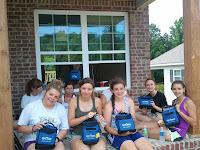Easter
morning worship begins with the ancient greeting (now in English) that
Christians have shared with one another for centuries to celebrate the
resurrection:
Christ
is risen!
Christ
is risen, indeed!
It
is an astonishingly simple proclamation.
Three words are all you need to tell the good news of Easter. Christ is risen. In the gospel according to Mark, when the
three women approach the tomb early on Sunday morning, they see a man dressed
in white who tells them not to be afraid - which, of course, they are, because
who is this? (but readers know that a mysterious figure who says “do not be
afraid” has got to be an angelic messenger of God) – anyway, this man says to
them: “you are looking for Jesus of Nazareth, who was crucified. He has been raised. He is not here.” No explanation of how he was raised, or what
exactly it means that he was raised: just the simple pronouncement.
He
has been raised. Christ is risen.
But
you’d like to know more, wouldn’t you?
You’d like to ask some follow-up questions. I know that I would. And maybe you have already filled in a lot of
the details when you picture the resurrected Jesus in your imagination. Maybe you have an idea of what he looks like,
and what it is like to see him.
Paul’s
letters, which are the oldest writings in the New Testament, older than the
gospels by several decades, speak of how Jesus appeared to his followers. In I Corinthians 15, Paul writes that the
risen Jesus “appeared to Peter, then to the twelve. Then he appeared to
more than five hundred brothers and sisters at one time, most of whom are
still alive, though some have died. Then he appeared to James, then to all
the apostles. Last of all, as to someone untimely born, he appeared also
to me.” The book of Acts, chapter 9,
describes the appearance of Jesus to Paul this way: “as he was going along and
approaching Damascus, suddenly a light from heaven flashed around him. He
fell to the ground and heard a voice….”
Did Paul mean that Jesus appeared to everyone with a light from heaven and a voice?
Did Paul mean that Jesus appeared to everyone with a light from heaven and a voice?
Later,
the written gospels of Matthew, Luke, and John describe Jesus appearing in
bodily form, but it is a different sort of body. He enters rooms through locked doors; he
breaks bread at a table and then disappears; he makes a fire on the
shore; he is difficult to recognize, being mistaken for a gardener, or a
stranger on the road. How do we make
sense of these various descriptions?
I
am intrigued by the what the New Testament says about the risen Jesus, because
it seems to me that the experience of meeting the risen Jesus was so profound
and so out of the ordinary that they never found language that could exactly
explain it. Easter doesn’t need precise
explanations. It is a wonderful,
mysterious experience. All it needs is
are the simple words: Christ is risen.

